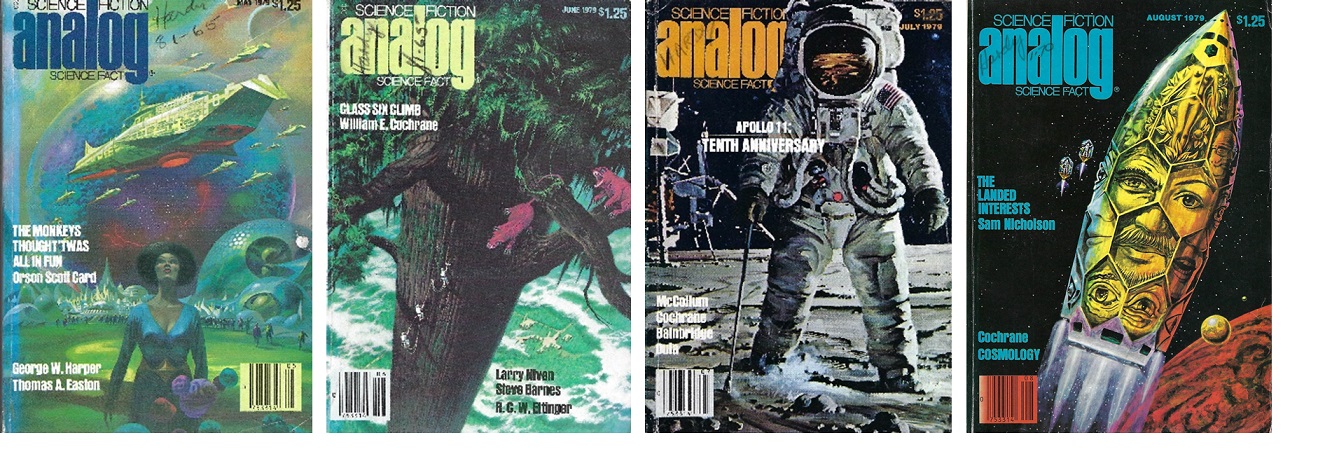



For another old magazine exploration, I selected one short story, novelette or novella from each issue of Analog from the year 1979.

January 1979
Orson Scott Card – Breaking the Game
This was an interesting and well
told tale. Interesting, because it’s a
story by Card about game playing – a theme he used to much success elsewhere of
course. This wasn’t nominated for any major awards, but it was voted the 2nd
best short story in Analog in 1979 by the magazine’s readers. In this tale, humans
spend only part of the time awake – and much of their long lives in a form of
deep sleep. Our protagonist wakes to play the game – a bit like Risk,
but over realtime and with the complexity of reality.
February 1979
Gary Alan Ruse – The Odds Man
This was a slightly daft story, ultimately, but it starts very strongly and is an engaging read. A man in a Soviet style gulag prison is released if he’ll explore the other side of a trans-dimensional gate, on behalf of the State. It has a lot of promise but has a jokey ending, when it could have been quite powerful throughout.
March 1979
Ted Reynolds – Can These Bones Live?
This was a good story. It placed first in the Analog reader’s poll at the end of the year for best Short Story and was also nominated for the 1980 Hugo Award. A lone human woman is resurrected by an alien race after humankind has long perished on Earth – should she and can she ask the alien race to resurrect other humans. It’s an ambitious piece and reads well, though I’d probably say it was a solid B+ kind of story, rather than being in the A-class bracket.
April 1976
Gregory Benford – Redeemer
This was terrific. I was glad to see a story by Benford, as I’ve been hoping I’d stumble on some of the well-known authors from this era in this read through. A pilot of a FTL ship catches up with a slow colony ship travelling to Tau Ceti, in or order to rib them. Well told, and gripping, this is top drawer SF from Benford. This was nominated for the Locus Award for best short story, but not either of the two major awards. And yet it’s aged very well, recommended.
May 1979
Paul J. Nahin – Old Friends Across Time
This is a short little tale, that supposes that there was more to Maxwell, the discoverer of electrical filed theory, than we know. It’s a nice tale, told through the eyes of an analyser of old photographs of the physicist, and I learnt a bit about Maxwell, an undoubted genius, so that was good.

June 1979
Larry Niven & Steven Barnes – The
Locusts
This was voted the second-best
novella in Analog in 1979. I like Niven and this had his usual big ideas
on display. Colonisation of a planet around Tau Ceti doesn’t go as planned, as
there’s something wrong with the offspring of the colonists that are born on
the new planet. It’s quite nicely done, and it’s a novel idea.
July 1979
Michael McCollum – Beer Run
This was kinda great. It’s said that
there are no new stories, and I as struck by this saying while reading this –
but not because of any lack of originality on show here. This story contains two of the main features of
the ‘Men in Black’ movies, to an almost uncanny degree, and then at the
end along comes one of the key tropes from ‘The Terminator’, told almost
exactly the same way. Now this was
written and published some years before either of those films… hmm, did the
filmmakers borrow these ideas, or was
it convergent evolution of imagination? Who
knows, but it was a decent story, and written in a clear engaging style.
August 1979
Edward Bryant – giANTS
This won the 1980 Nebula Award for Best Short Story and was also
nominated for the Hugo and Locus awards. It’s pretty good but not perfect by
any means. I liked the idea of the giant
ants and the reason for their creation more than the execution of the story. It
seemed rather disjointed in the telling, and the reason for the very end is
unclear (I guess you can make your own mind up), but I was left wondering whether
there was more to this than met the eye, or less.

September 1979
Timothy Zahn – Ernie
This short story was not a hit at the time is was published, perhaps because the author was previously unpublished before this story made it into Analog. Yes, this is Timothy Zahn's first published work of fiction. It's about a teenage boy who can teleport very short distances, and only laterally, not up and down. The only use he can think to make of his talent is in the boxing ring, but maybe there's more to life than this... This is a great story, well told, and I thoroughly enjoyed it. Zahn would of course go on to become probably the most famous writer of Star Wars 'Extended Universe' novels.
October 1979
Mack Reynolds - The Case of the Disposable Jalopy
Another case of a writer who was popular and well regarded in his day, but who has dropped from the collective SF consciousness almost entirely in recent times. This is a shame as Reynolds writes exuberant and thought-provoking SF with a humorous but critical eye over current social ills. This is an energetic novelette set in a future New York, where a detective is employed by three English employees (called Clarke, Aldiss and Brunner) of a local disposable car company to track down what's sabotaging their car company. It's a biting little social satire.
November 1979
Thomas A. Easton - Movers and Shakers
This was a light, but rather fun little tale of an alien who gives a blue-collar worker a leg up... but for what reason? It reminded me little of Simak, what with the trope of an alien on Earth engaging with a human of little importance. Easton wrote a lot of SF in the 70's and also contributed book reviews to Analog for many years.
December 1979
Dean McLaughlin - Long Shot
A short little tale of what happens when a scientist adds a cultural package to an outbound space probe. A nice idea, but too short to be very much. McLaughlin's SF writing spans several decades with his first short story in 1951, and his last in 2008. His best-known work is probably Hawk Among the Sparrows (1968), which was nominated for both the Hugo and Nebula awards for Best Novella.